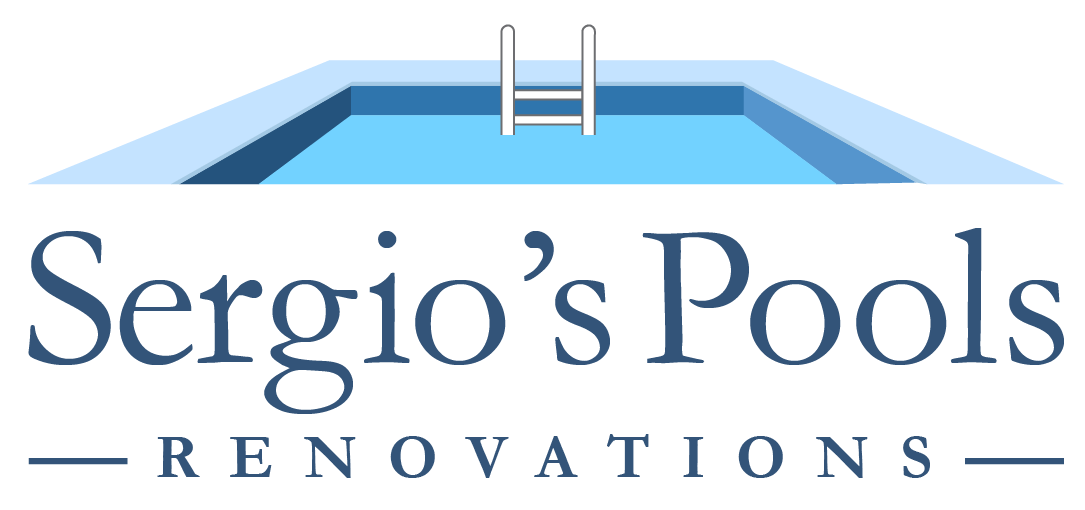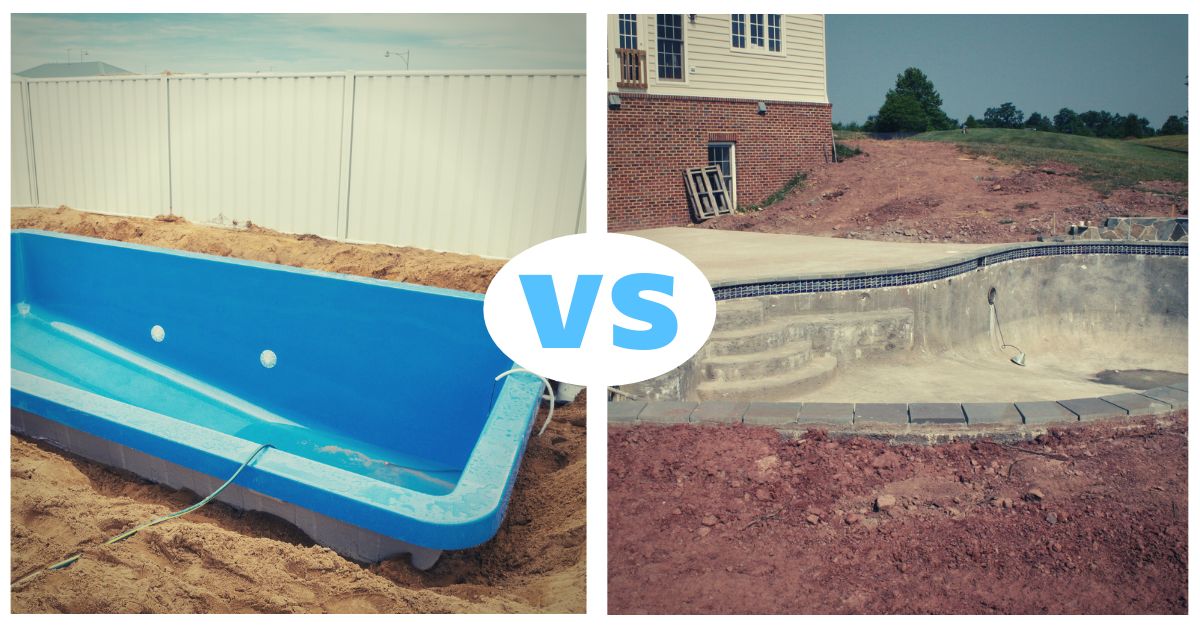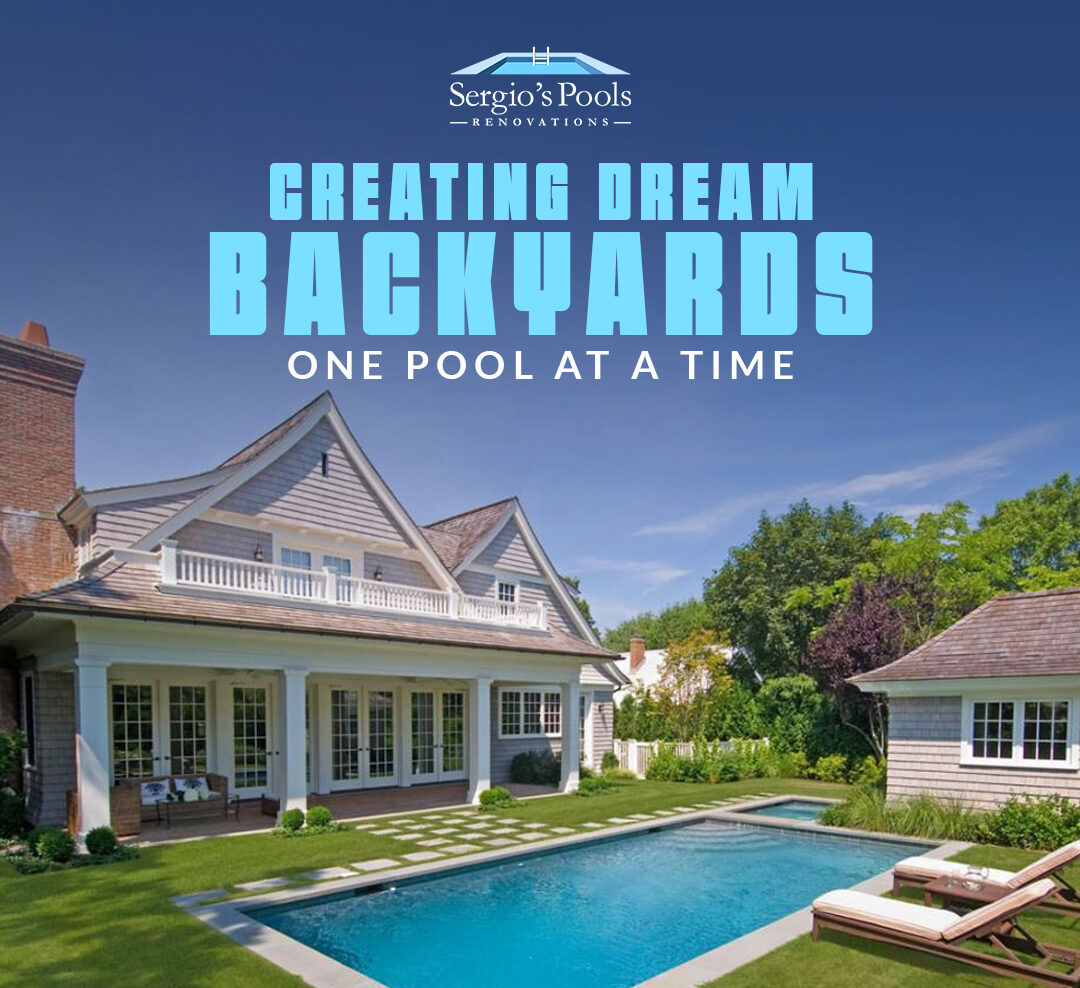There are several factors to consider when choosing between fiberglass pools and concrete pools. Making an informed choice based on your own requirements and preferences is crucial because both methods offer distinctive advantages and disadvantages.
Fiberglass pools are pre-built on existing molds so that they can be installed in as little as 3–6 weeks. However, concrete pools require more long-term maintenance and can take 3–6 months to install.
Ultimately, the choice of concrete pool vs fiberglass depends on your budget, desired level of customization, and long-term maintenance preferences. Stay tuned for the full blog post, where we’ll discover the pros and cons of each option based on expert insights and real-life experiences.
Pros and Cons of Fiberglass Pools
Fiberglass pools have gained popularity as an attractive alternative to traditional concrete or vinyl pools. These pools are known for their smooth and durable surfaces, quick installation, and low maintenance requirements.
However, like any other choice, they come with their own set of pros and cons. In this section, we will explore the advantages and disadvantages of fiberglass pools to help you make an informed decision if you are considering installing one.
Pros of Fiberglass Pools
Low Maintenance
Fiberglass pools are celebrated for their low maintenance requirements. Unlike concrete pools, which require regular acid washing and resurfacing, and vinyl pools, which can tear and need replacement, fiberglass pools have a smooth and non-porous surface that resists algae and stains.
This reduces the need for chemical usage and cleaning, saving you time and money in the long run.
Durability and Longevity
Fiberglass pools are built to last. They are constructed from a single, durable shell that is less likely to crack or develop leaks than concrete pools. A fiberglass pool can serve you well for several decades with proper care and supervision.
Smooth and Non-Porous Surface
The smooth surface of a fiberglass pool not only feels great on the skin but also inhibits the growth of algae and other microorganisms. This means less time spent scrubbing and more time enjoying your pool.
Quick Installation
Fiberglass pools are pre-fabricated and come in various shapes and sizes. This means they can be installed relatively quickly compared to concrete pools, which involve extensive excavation and construction of fiberglass versus concrete pools. You can often swim in your new fiberglass pool within a few weeks of ordering it.
Cons of Fiberglass Pools
- Limited Design Options: While fiberglass pools come in various shapes and sizes, they may offer a different level of customization than concrete pools. If you have a specific, unique design in mind, there might be better choices than a fiberglass pool.
- Initial Cost: The upfront cost of a fiberglass pool can be higher than that of a vinyl pool but slightly lower than that of a concrete pool. While you may save money on maintenance and repairs over time, it’s important to consider your budget.
- Vulnerability to Damage during Transportation: Fiberglass pools are delivered to your location in one piece, which means they must be transported over roads. This transportation can be risky, and if handled properly, the pool shell can be protected in transit. It’s crucial to work with a reputable installer to mitigate this risk.
Ultimately, choosing fiberglass vs concrete pool depends on your budget, design preferences, and long-term maintenance considerations. It’s essential to carefully weigh the pros and cons before ensuring that your chosen pool type aligns with your needs and expectations.
Pros and Cons of Concrete Pools
Concrete pools have been a popular choice for homeowners for decades, offering a timeless and customizable option for swimming pool size construction. However, like any pool type, they come with their own set of advantages and disadvantages.
Pros of Concrete Pools
- Customizable Designs: One of the most significant benefits of concrete pools is their ability to be completely customized to suit your preferences. Whether you want a unique shape, size, or intricate features like waterfalls and spas, concrete pools can be designed to meet your vision.
- Long-Lasting with Proper Maintenance: Concrete pools can last for many decades when properly built and maintained. Regular maintenance and resurfacing every 10-15 years can ensure the pool’s longevity, making it a solid investment.
- High-End Aesthetics: Concrete pools are known for their luxurious and high-end appearance. The surface can be finished with various materials like pebble, tile, or plaster, allowing for a wide range of aesthetic choices.
- Sturdy and Durable: Concrete is a robust material that can withstand various weather conditions and external pressures, making it a suitable choice for regions with extreme climates or where the soil may shift.
Cons of Concrete Pools
- Expensive Construction and Maintenance: Concrete pools tend to have higher initial construction costs compared to other pool types, primarily due to the labor-intensive installation process and customization options. Ongoing maintenance costs can be significant, including resurfacing, re-tiling, and chemical treatments.
- Prone to Cracks and Leaks: Concrete is susceptible to cracking over time, especially in areas with freeze-thaw cycles or ground movement. These cracks can lead to water leakage, which can be costly.
- Longer Installation Time: Building a concrete pool is time-consuming compared to other pool types. It typically involves excavation, steel reinforcement, and the application of multiple layers of concrete, which can result in a longer installation timeline. Working with a Pennsylvania pool builder can save you time and effort.
- Potential for Algae Growth: Concrete surfaces are porous, which can provide a breeding ground for algae and other microorganisms. This can lead to more extensive cleaning and chemical treatments to maintain water quality.
- Chemical Imbalance Issues: Concrete pools may require more frequent water chemistry monitoring due to the porous surface’s interaction with pool water. Maintaining proper chemical balance in fiberglass or concrete pools is crucial to prevent scaling, staining, and other water quality issues.
Factors to Consider When Selecting Between Fiberglass and Concrete Pools
Choosing between fiberglass and concrete pools is a significant decision for homeowners, and several key factors should be considered to make an advised choice.
Both pool types have their own advantages and drawbacks, so understanding your priorities and needs is crucial. Below are the important factors to consider when deciding between fiberglass and concrete pools:
- Budget: Your budget is a fundamental consideration. Fiberglass pools often have a lower upfront cost compared to concrete pools. However, it’s essential to factor in long-term maintenance and operational costs, as these can vary between the two types.
- Design Preferences: It can be a main difference between fiberglass and concrete pools.
Consider the design options you desire. Concrete pools offer virtually limitless customization possibilities, allowing you to create a pool that perfectly matches your vision. Fiberglass pools, on the other hand, come in pre-molded shapes and sizes with limited customization options. - Installation Timeline: Fiberglass pools are typically quicker to install than concrete pools if you want to enjoy your pool sooner. Concrete pool construction is more complex and time-consuming due to excavation, reinforcement, and curing.
- Maintenance Requirements: Fiberglass pools generally require less maintenance than concrete pools. The smooth, non-porous surface of fiberglass resists algae growth, reducing the need for chemicals and cleaning. Concrete pools may require frequent maintenance and resurfacing to keep them in top condition.
- Climate and Geographical Factors: Consider your local climate and geographical factors. Fiberglass pools are less susceptible to damage from ground movement or freeze-thaw cycles, making them suitable for regions with such challenges. Concrete pools may require additional structural reinforcement in such areas.
- Durability and Longevity: Fiberglass pools are known for their durability and can last several decades with proper care. Concrete pools can also last long but may require resurfacing every 10-15 years to maintain structural integrity.
- Aesthetics: Think about the aesthetics you desire for your pool. Concrete pools can be finished with materials like tile, pebbles, or plaster, allowing for a wide range of appearances. Fiberglass pools have a smooth, gel-coated surface that can be less customizable in terms of finish.
- Environmental Impact: Consider the environmental impact of your choice. Fiberglass pools may have a lower ecological footprint during installation due to quicker construction times.
However, concrete pools can be designed with eco-friendly features such as energy-efficient equipment and solar heating systems. Consider weekly pool maintenance to keep your pools neat.
- Resale Value: If you plan to sell your home, consider how your choice will impact the value. Both fiberglass and concrete pools can add value to a property, but it’s crucial to maintain them properly to maximize their resale potential.
- Personal Preferences: Ultimately, your preferences and lifestyle play a significant role. Some individuals prefer fiberglass pools’ smooth, easy-to-clean surface, while others value the creative freedom concrete pools offer.
The choice between fiberglass and concrete pools should align with your needs, budget, and preferences. Carefully weighing these factors and consulting with pool professionals can help you make the best decision for your home and lifestyle. Each pool type has its unique advantages, and the choice ultimately comes down to what matters most to you as a homeowner.
In the End
In the enduring debate of fiberglass versus concrete pool, it’s clear that both options have their merits and cater to different needs. Fiberglass pools offer low maintenance, durability, and a smooth surface, making them an excellent choice for those seeking convenience and longevity.
On the other hand, concrete pools provide unparalleled customization and high-end aesthetics for those who want to create a unique aquatic oasis.
The good news is that regardless of your chosen path, the joy of owning a swimming pool is a constant. It’s a place for relaxation, recreation, and cherished moments with family and friends.
So, as you embark on this exciting journey, remember there’s no wrong choice—only the pool that suits your lifestyle and preferences best. Dive into the pleasure of pool ownership, and let your backyard become the haven you’ve always dreamed of!






